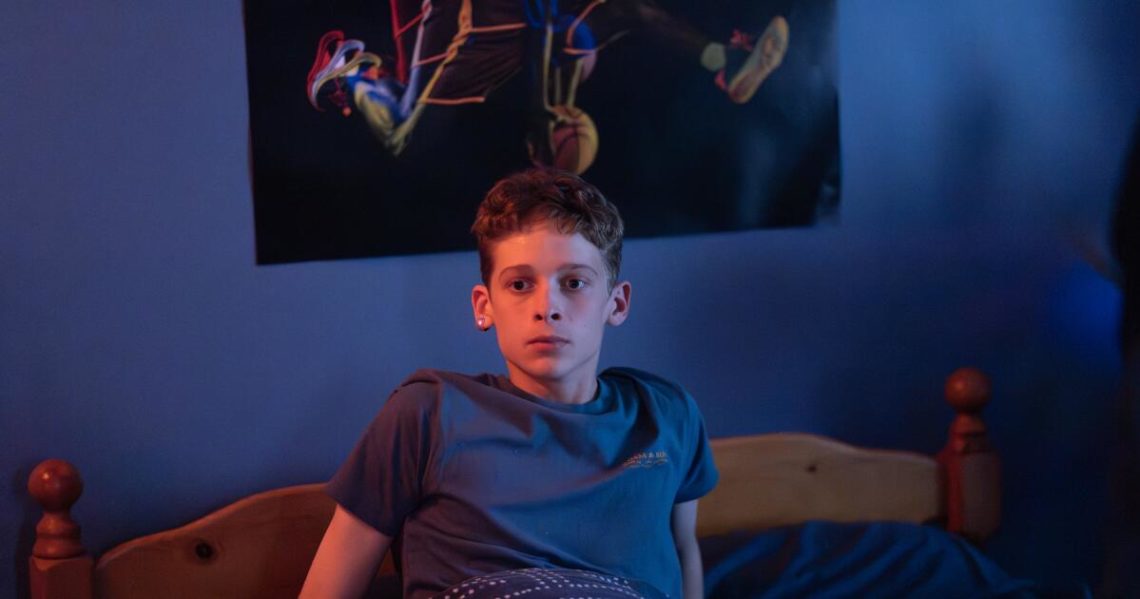“The Institute,” a 2019 novel by Stephen King, Maine’s Master of the Macabre — or horror, I just said macabre for the alliteration — has become a miniseries with some major additions and minor emendations. Premiering Sunday on MGM+, it belongs to a popular genre in which superpowerful young’uns are gathered in some sort of academy, and more specifically to one in which children with extraordinary powers are weaponized by adults for … reasons. They always have reasons, those cruel adults.
The child at the center of the story is 14-year-old Luke Ellis (Joe Freeman, who shoulders a lot of dramatic weight), a genius with a mostly untapped ability to move things with his mind. (Classic power!) One night while Luke is asleep, people break into his house, and when he wakes in the morning in his bed, you know as well as I that what he’ll find outside his bedroom door is not the rest of his house — just like Patrick McGoohan in “The Prisoner,” one of several other works for the screen that may cross your mind as the show goes on. “Stranger Things,” “The Matrix,” “One Flew Over the Cuckoo’s Nest,” “The Breakfast Club” and “Severance” are some others that came to my mind.
Luke is in the Institute, a drab complex, whose young inmates are identified either as “TK” (telekinetic) or “TP” (telepathic), or once in a blue moon, “PC” (precognitive). Just how Luke’s kidnappers fixed on him in the first place is something for you not to think about. But there he is, and because he is also a genius, his warders think he might be more than usually useful to them. Ms. Sigsby (Mary-Louise Parker) runs the place; her cheery tone and promises of fun food and no bedtime does not hide from you, or from Luke, the fact that she is a liar. That she tells Luke he’s there as part of a project to “serve not just your country but the whole world” is not something to impress any kidnapped teenager.
Aiding and abetting Sigsby are sepulchral security head Stackhouse (Julian Richings), who at one point will speak the words “unjustly vilified term final solution”; Tony (Jason Diaz), an almost comically sadistic orderly; and Dr. Hendricks (Robert Joy), who has cooked up the pseudoscientific nonsense at the heart of the plan and puts Luke through a variety of upsetting “tests.” Housekeeper Maureen (Jane Luk) is nice, though — not to be completely trusted, necessarily, but nice.
Meanwhile, handsome Tim Jamieson (Ben Barnes), a former policeman, decorated for an incident that left him bad about feeling decorated, hitchhikes into town — the town near the Institute, whatever it’s called — and gets himself a job with the local constabulary as its “nightknocker,” checking that businesses have locked their doors and the streets are trouble free. At the police station, he meets Officer Wendy Gullickson (Hannah Galway), which makes space for some light guy-gal vibing, while his nocturnal peregrinations will bring him into contact with Annie (Mary Walsh), a street person and conspiracy theorist, who does know an actual thing or two, and who will inspire Tim to poke around that place up on the hill with the guards and the barbed-wire fence. He may not be a cop anymore, but he is not, he says, “the kind of guy who can look the other way.”
At the mostly empty, sort of shabby Institute — like a student center that hasn’t been updated in 30 years, because what’s the point — Luke meets fellow inmates Kalisha (Simone Miller), who inexplicably kisses him upon first meeting, Iris (Birva Pandya), cool kid Nick (Fionn Laird), and later little Avery (Viggo Hanvelt), who may prove the most powerful of all.
The institute has a Front Hall and a Back Hall; at some point, kids from the former are transferred to the latter, which completes a “graduation” the staff mark with a cake and candles. (They’re told that after doing time in the Back Hall, they’ll be going home, which could not possibly be part of the plan.) The meaning of the column of smoke rising from one of the compound’s buildings should be immediately obvious.
Written by Benjamin Cavell (who co-wrote the 2020 adaptation of King’s “The Stand”) and directed by Jack Bender (King’s “Mr. Mercedes”), it drags at times and isn’t particularly interesting to look at, though there’s action and a few special effects toward the end, which, King being King, isn’t over until it’s over — and it never is. Parker is always good to watch, and her Mrs. Sigsby is given some material to make her seem human — if not quite to humanize her — but nothing regarding the Institute and its complicated plans and methods really makes any sense, even in King’s made-world.
Still, if you regard “The Institute” as a kind of YA novel about resistance and revolt, and a metaphor for the way young people have been sacrificed by the old to feed their agendas and wars, it has some legs.
The post Stephen King’s ‘The Institute’ sets gifted children against nefarious adults appeared first on Los Angeles Times.




